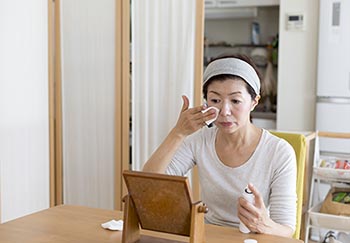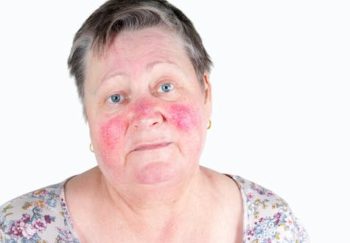I’ve always thought that I had fairly healthy, normal skin — some mild eczema, maybe, but nothing serious or obvious. But one winter day, I was in a natural foods store picking out shampoo, and a vendor who had a table nearby stopped me. “Excuse me,” he said. “I can’t help but notice your hands are really dry and red, and I think my product would help.”
I was bemused by his boldness (“Hey! We’ve never met, but your hands are ugly”), and I was also certain that his fragrant herbal product would only sting my cracked knuckles. I said no thank you and walked away.
Rather than rely on the scented-product-pusher, I turned to UVA dermatologist Barrett Zlotoff, MD, to answer common questions about skin care.
Skin Care Frequently Asked Questions
What should adults with no known skin conditions be doing regularly to take care of their skin? Especially the face?
One of the things people don’t often think about is cigarette smoking. Smoking speeds up how quickly your skin ages and really can cause lines around the mouth. So quitting smoking is a great way to help take care of your skin.
Applying sunscreen every day before you go outdoors is another simple, cheap way to prevent wrinkles, skin discoloration, skin aging and skin cancer. I recommend a sunscreen that covers UVA and UVB with an SPF of at least 30.
Do you recommend using lotion or a facial moisturizer? Anything in particular to look for with these products?
Moisturizing the skin of the entire body, particularly the face, is great for skin health. It helps maintain the barrier of the skin, keeping it healthy and avoiding small breaks in the skin that can let dirt, allergens and bacteria or other infections in. If you use a moisturizer with a 30 SPF sunscreen in it, it will kill two birds with one stone.
Avoid products with strong smells or fragrances. Even though products with a lot of natural plant or botanical ingredients can sound nice, these ingredients are a common cause of allergic contact dermatitis. Less is more when it comes to ingredients for facial moisturizers.
Of course, sunscreen is important. Will a higher SPF allow you more time in the sun before you re-apply?
A sunscreen with an SPF of 30 blocks up to 97 percent of the sun’s rays, so going much higher does not buy you much more sun protection. Higher SPFs block slightly more rays, but a higher-number SPF does not allow you to spend more time outdoors without reapplication.
Most dermatologists recommend re-applying every couple of hours. If you are in the water or sweating, you may need to reapply more often.
Soap has a reputation for drying out your skin; should people use body wash or something else instead?
Avoiding soap may decrease disruption of the “skin barrier” that keeps in moisture and keeps out dirt and bacteria. There are non-soap cleansers called synthetic detergents or “syndets” that are less drying than true soap and also don’t change the pH of the skin so much. Avoiding soap and cleansers in general is probably better for skin.
A lot of the time, you can just use soap in the folds and areas of the skin such as armpits, groin and face that are more sweaty and oily.
Over-washing and cleaning areas of inflamed or irritated skin can make those areas more inflamed. After washing hands with soap or other cleansers, apply a thick cream or petroleum jelly ointment to keep moisture in the skin of the hands. After using soap, a moisturizing cream will help keep moisture in the skin.
Many beauty products claim to be “for sensitive skin.” What does this mean — what makes the products different?
I guess they are referring to having skin that is prone to allergic reactions or that the person may have a skin barrier that is easily disturbed by soap, changes in pH or other product.
Again, the less ingredients, the better. You’re less likely to get allergic reactions from a product with fewer added fragrances and chemicals. Products with a million herbal or botanicals in them smell nice, but we are probably even more likely to be allergic to “natural” ingredients in products as we are to the chemical ones.

This is why dermatologists often recommend petroleum jelly ointment or even simple vegetable oils like vegetable shortening, sunflower oils or coconut oils. These have been found to be good for sensitive skin, and most people are not allergic. On the other hand, research seems to show that olive oil can dry out your skin by breaking down the skin barrier that keeps in moisture.
Are there any problems with using these products if you don’t have sensitive skin?
There is no problem with using these products if you don’t have sensitive skin. Everyone has “sensitive skin” to some degree and using these products is probably good for all skin.
Do anti-aging products make a difference?
The answer is probably that we don’t know. The research is so bad and so biased on these products. Most of the research is sponsored by the company making the products.
There are a few things, like tretinoin or retinol products, that seem to have good evidence for getting rid of fine lines. You can discuss these products with your dermatologist, but watch out when any doctor is selling products out of their office and specifically recommending only their products without giving you other options. Obviously, there is a conflict of interest there.
Anti-Aging Products Questions?
Talk to an expert: Make an appointment with a UVA dermatologist.
Mole changes can indicate melanoma. Beyond that, are there other symptoms of cancer or serious skin conditions that we should look for?
Areas where the skin is broken down or bleeding that just won’t heal after a few weeks of good skin care with something like petroleum jelly every day are worrisome and potentially cancerous. Get it checked if it’s:
- Growing fast
- Itching
- Bleeding
- Changing color quickly
It’s better to be safe and just get it checked. Skin cancer is so much easier to treat when we catch it early.
Is there anything else we should know about taking care of our skin?
Don’t forget your lips. Skin cancers on lips are some of the most dangerous and hard to treat. Wear a petrolatum or wax based lip protectant with at least a 30 SPF sunscreen in it. If you don’t want to use chemical sunscreens for your lips or skin, you can use a product with a “physical blocker” like zinc or titanium as a sunblock.
Or if you want to avoid sunblock, just cover up with sun protective clothing, wide-brimmed hats, sunglasses or other clothing to cover your skin. You can actually buy clothing with a sun protective factor rating on it now. There are multiple companies online that sell these products.

